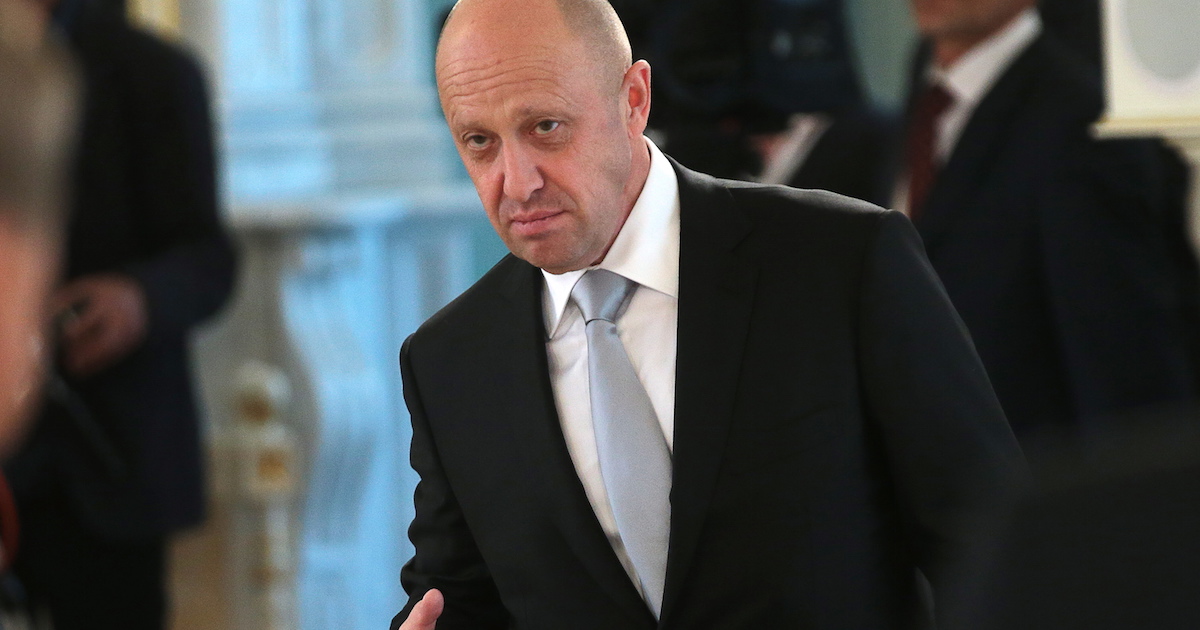
Russian mercenary army financier made an oil deal with Syria just before clash with U.S. troops
The Bell has learned that a company linked to Yevgeny Prigozhin signed the deal just before the Wagner mercenary army attacked American forces in Deir ez-Zor

Photo credit: Mikhail Mettsel/TASS
The legally binding agreement regarding work in Syria by the company, Evro Polis, was signed not long before soldiers from the Wagner mercenary army clashed with American troops in the oil & gas province of Deir ez-Zor, The Bell has learned. As a result of the attack, according to different sources, an estimated ten to more than 200 people were killed or injured. Both Wagner and Evro Polis are associated by the media with businessman Evgeny Prigozhin.
Evro Polis entered into the preliminary agreement at the end of 2016 with the Syrian government to participate in the liberation, defense and development of Syria’s oil & gas fields. The Bell learned from two sources from the Russian side, familiar with the company’s negotiations, that the company finally entered into binding agreement. One of these sources confirmed that it was signed around January 2018. At the very end of January, the Russian Ministry of Energy announced that it had signed with Syria a “road map” for the repair, modernization, and construction of new energy facilities in Syria.
The details of this agreement were not published. However, the Syrian ambassador to Russia, Riad Haddad told The Bell that in January the Ministers of Energy of Syria and Russia signed not one, but two “road maps” – for work in both the electricity and oil sectors. These documents included agreements signed earlier with specific Russian companies. Evro Polis is one of these companies, Ambassador Haddad confirmed. These signed agreements are needed in order to “keep track of (at the government level – The Bell) agreements already in existence and of projects which were identified as priorities”, he added.
What did Prigozhin claim in Syria?
Fontanka and RBC wrote last summer about Evro Polis and its connection to businessman Evgeny Prigozhin and his associates. This same information has also been confirmed by U.S. intelligence, The Washington Post reported last weekend.
According to Fontanka, at the end of 2016 during meetings between the Syrian Minister of Petroleum and Natural Resources, Ali Ganev with Russian Minister of Energy, Alexander Novak, Evro Polis signed a memorandum of intent to work in Syria. This document revealed that the company laid claim to one quarter of all oil & gas produced on those Syrian territories reclaimed for Bashar al-Assad’s government. Evro Polis promised to liberate Syria’s oil and gas fields and oil refining infrastructure from Islamic State fighters and rebels fighting against the Syrian government, and then to provide for defense of these assets.
Prigozhin’s interest in developing Syria’s oil and gas fields was also confirmed by a source close to the businessman who spoke with RBC, and by sources within Wagner. Prigozhin invested in Wagner with the aim of earning revenues not only from military activities, but also with the intent of receiving some kind of dividends, a source inside Wagner told RBC. According to the source, “the primary focus” from the beginning was on Syrian oil.
In December of last year, the Associated Press published a document, which appeared to be a draft of the Evro Polis agreement with the Syrian government and Syria’s state owned General Petroleum Corp. Evro Polis would take upon itself “the responsibility of liberating” oil and gas fields on some Syrian territories, and begin production on these fields, and would be responsible for oil and gas refining, transportation, storage and sales, together with General Petroleum Corp, which is the parent company of both the Syrian Petroleum Company and the Syrian Gas Company.
It is unclear which terms were included in the final agreements which were signed between Evro Polis and the Ministers of Energy. We were not able to reach representatives of Evro Polis on any of the phone numbers listed for the company in the SPARK database. Evgeny Prigozhin, the press service of the Ministry of Energy and the Syrian Ministry of Petroleum and Natural Resources all refused to answer The Bell’s questions.
What is known about the reason for the battle in Deir ez-Zor?
The battle took place during the night of February 7-8, and was the first time in the Syrian conflict when Wagner’s forces fought directly against American troops. The mercenary army’s unit and members of the so-called ISIS Hunters came under fire from the U.S. Air Force. The exact number of casualties and their nationalities have still not been officially confirmed.
U.S. troops and pro-government forces supported by Russia were both very near to the location of the battle – they were just a few miles from each other on opposite sides of the Euphrates River, reported The Washington Post. According to it, until recently, Russian and American troops were in almost daily contact by telephone, in order to avoid accidental collisions.
The Pentagon announced in an official statement following the attack, that it had not confirmed the identity of the attackers. Directly following the battle, U.S. Secretary of Defense, James Mattis announced that he cannot explain why pro-government forces decided to cross the river and open fire on a well-known base used by U.S. forces and its allies.
The Russian Ministry of Defense denied that Russian armed forces had taken part in the attack. In an official statement, the ministry said that “the cause of the incident were reconnaissance and search operations carried out by the Syrian militia which had not been agreed with the command of the Russian operational group.” Two weeks after the battle, the Russian Ministry of International Affairs admitted that Russian citizens were killed in the battle, and confirmed “dozens injured” and five dead, emphasizing that none of these Russian citizens had any affiliation with official Russian military structures.
Kommersant quoted a Russian military source and wrote that the reason for the incident was supposedly an attempt by Syrian “major industrialists”, loyal to Bashar al-Assad, to reclaim oil and gas fields which were under Kurdish control – U.S. allies.
“The plan was that, after shelling, our guys would quickly storm and take the factory [the U.S. base is located on a Syrian refinery], the Kurds would drop their weapons. And the Americans would no longer put up a fight when the battle draws close,” – write Kommersant quoting a former mercenary who served alongside several of those Wagner mercenaries who died in the battle on February 7. According to the source, the Wagner unit, bombarded from the air by American planes, was comprised of almost 600 people, armed with light arms, as well as artillery and tanks. The majority of the group was comprised of Russian mercenaries; ISIS Hunters made up only a minority of the force. The unit did not have any support from the air.
A military source, quoted by Kommersant, stated that Russian commanders in Syria did not authorize an offensive operation on oil fields, and that the operation itself was seen as “a dangerous amateur performance”. But The Washington Post wrote this past weekend, citing American intelligence reports, that just before the attack by Wagner’s forces, Prigozhin was in close contact with both Russian and Syrian government representatives, including the head of the Russian presidential administration, Anton Vaino.
Irina Malkova, Anastasia Stogney, Anastasia Yakoreva





